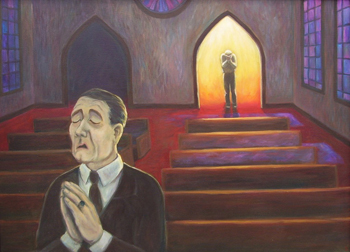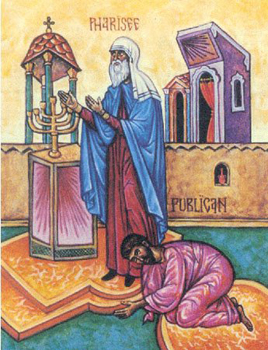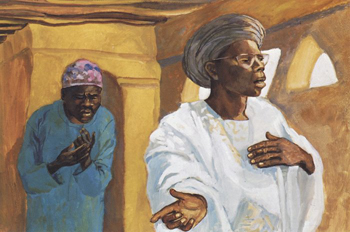For Sunday October 27, 2019
Lectionary Readings (Revised Common Lectionary, Year C)
Jeremiah 14:7-10, 19-22
Psalm 84:1-7
2 Timothy 4:6-8, 16-18
Luke 18:9-14
In this week’s Gospel reading, Jesus tells a parable “to some who trusted in themselves that they were righteous:” Two men go up to the temple to pray. The first is a Pharisee, a religious insider who serves a vital leadership role in the spiritual life of his community. In the guise of a heartfelt “thank you,” he makes a personal progress report to God: “I thank you that I am not like other people: thieves, rogues, adulterers.” He then humble brags about his pious lifestyle: “I fast twice a week; I give a tenth of all my income.” Presumably, he leaves the temple feeling exactly the same way he felt when he walked in: just fine. No growth, no change.
The second man is a tax collector, a collaborator with the Roman Empire, and a traitor to his own people. He stands “far off,” beats his chest, and refuses to raise his head towards heaven. He prays just one line: “God, be merciful to me, a sinner!” But Jesus concludes that it is the tax collector and not the Pharisee who goes home justified, “for all who exalt themselves will be humbled, but all who humble themselves will be exalted.”
On its face, this is a very simple parable. It feels silly to interpret it when its message is so obvious. But here’s the trap, expressed as a prayer I am sorely tempted to pray in response: “Lord, I thank you that I am nothing like the obnoxious caricature of a human being who is the Pharisee in your story. Thank you that I have arrived at a point in my faith journey where I am much more like the tax collector: self-aware, emotionally intelligent, mindful, cognizant, teachable, humble, and woke.”
Yikes.
 |
I don’t know many people — religious or secular — who like the word “sinner.” Many Christians, particularly those of us who have moved away from fundamentalism, actively dislike the word. We associate it with shame, self-punishment, and creepy sermons about hellfire. Too often, “sinner” is a word that frightens us away from God rather than drawing us closer to him.
We also distrust the word because we understand how easily it can be manipulated to justify one moral or political agenda over another. In some churches, sinners are people who support abortion rights or marriage equality, while those who rape our planet and systemically exploit the poor get a pass. In others, capital "S" sins include hawkish foreign policy, capital punishment, and corporate greed. Not loveless sex, abject social media addiction, or the toxicities of “cancel” culture.
In this week’s Gospel reading, Jesus doesn’t shy away from the big, bad “S” word. He insists on it. He insists on the practice of acknowledging and naming our core sinfulness. He insists on the healing, cleansing, justifying power of honest confession.
Why? Because honest confession relieves a burdensome secret. It tells the truth, which is that I am a beautiful mess — made in God's divine image, but mired in a human brokenness that wars against its own salvation. To use the word "sinner" in my prayer life is to insist on something more profound and more clarifying than, "I make mistakes," or "I’ve got issues." To use the word sinner is to refuse the arrogant us/them divide of the Pharisee, and instead acknowledge that I, too, am utterly lost and bereft, but for the astonishing grace of God.
One of the things that surprises me about Jesus’s parable is that the tax collector makes his confession in the temple — right smack in the middle of a house of public prayer and worship. I wonder: are our houses of worship places where authentic confession is welcomed and practiced? Are our churches safe for sinners to tell their messy, vulnerable-making truths? Or are they better suited for the making of pious progress reports akin to the Pharisee’s? Are our religious structures and institutions open to the abject cries of the wretched? Or is church the place we go to shine, show off, and compare our faith-tinted trophies?
 |
Note that the tax collector in the parable doesn’t name specific sins. He goes much deeper — he names a brokenness that is cellular, a brokenness that is central to his very being. Growing up, I was taught that sin is "breaking God's laws." Or "missing the mark," as an archer misses his target. Or "committing immoral acts." These definitions aren't wrong, but they only scratch the surface. They assume that sin is a problem primarily because it angers God. But God's temper is not what's at stake in my sinfulness; he's more than capable of managing his own emotions. Sin is a problem because it kills. It kills me.
Sin is a refusal to become fully human. It's anything that interferes with the opening up of my whole heart to God, to others, to creation, to myself. Sin is estrangement, disconnection, sterility, disharmony. It's the slow accumulation of dust, choking the heart. It's the sludge that slows me down, that says, "Quit. Stop walking. Lie down. Change is impossible."
Sin is apathy. Care-less-ness. A frightened resistance to an engaged life. Sin is the opposite of creativity, the opposite of abundance, the opposite of coherence, the opposite of flourishing. It is a walking death. My life, precious to God, dying.
What Jesus exposes in his parable is the Pharisee’s compulsive need to avoid his broken inner life by policing his outer boundaries instead — deciding who is “in” and who is “out,” based on his own narrow definitions of purity and piety. It’s easy for us 21st century Christians to look down on his arrogance, but honestly, are we much different? Don’t we behave sometimes as if we’re finished products, with nothing new to discover about the Holy Spirit’s excavations into our inner lives? Don’t we set up religious litmus tests for each other, based on personal inclinations and pieties that have nothing to do with Jesus’s open-hearted love and hospitality? Don’t we fixate on the forms of religiosity we can put on display for others to applaud, instead of cultivating the secret and hidden life of God within our own souls? Don’t we allow scorn — disguised as holy indignation — to take root and grow in our hearts, until love sours and empathy dies?
This seemingly simple parable should give us pause, especially if we are “cradle” Christians who have a long history with the Church. It is possible to do all manner of impressive religious things, and still walk away unjustified. It is possible to allow our piety itself to deaden us to God's Spirit. It is possible to pray without touching anything within us that matters. It is possible to practice an outwardly beautiful Christianity that is ashen, lifeless, and pointless in the eyes of Christ.
 |
It doesn’t matter what specific forms our religious arrogance takes. In some churches, it centers around impressive social justice projects. In others, it comes down to deifying one worship style over another. In still others, it means policing the political affiliations and allegiances of parishioners. In some faith communities, the lines in the sand have to do with women clergy, or gay marriage, or racial justice, or economic equality. The guises vary, but in the end, arrogance in any guise deadens us towards God and towards our neighbors. It freezes us in time, making us irrelevant to the generations that will come after us. It makes us stingy and small-minded, cowardly and anxious. It strips away our joy and robs us of peace. It causes us, in Jesus’s chilling words, to “honor God with our lips” but to “worship him in vain.”
I both love and find it maddening that Jesus doesn’t end his parable by saying, “The tax collector went forth and sinned no more.” In fact, we have no idea what the man does once he leaves the temple. We never find out if he gives up his dishonest profession, or returns the money he has unfairly taken from his neighbors, or ends up back in the temple a week later, just as full of remorse as he was before. In other words, we have no idea if he does anything to justify God’s lavish mercy towards him. And that is precisely the point. The lavish mercy of God cannot be earned. It can only be received. Confession is the opening up of our empty hands to receive the abundant mercy of God.
Two men go up to the temple to pray. One preens, the other weeps. One self-protects, the other surrenders. One catalogues, the other confesses. God hears both prayers. But only the honest and desperate prayer of confession changes a life.
Debie Thomas: debie.thomas1@gmail.com
Image credits: (1) John the Baptist Artworks; (2) Fuel for the Journey; and (3) Camas Friends Church.





